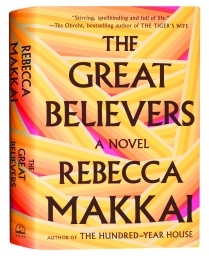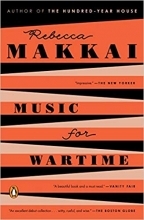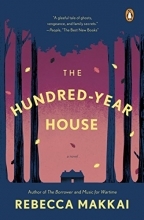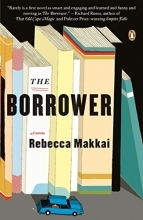Spotlight On Rebecca Makkai MA '04

Rebecca Makkai MA ’04 is the author of a short story collection and three novels, the most recent of which—The Great Believers—was a finalist for the 2019 Pulitzer Prize. Novelist Michael Cunningham writes in the New York Times, “Rebecca Makkai’s The Great Believers is a page turner … among the first novels to chronicle the AIDS epidemic from its initial outbreak to the present—among the first to convey the terrors and tragedies of the epidemic’s early years as well as its course and repercussions… . An absorbing and emotionally riveting story about what it’s like to live during times of crisis.”
Review: The Great Believers
Published in Middlebury Magazine, Fall 2018
Within the first few pages of The Great Believers, the latest novel from Rebecca Makkai MA ’04, we enter one of the most captivating and emotional works of historical fiction of recent time. Making leaps between decades, in alternating chapters, between Chicago in the 1980s and modern-day Paris, she creates two plots, wholly different in substance but parallel in spirit.

Half of the novel follows Yale Tishman, an openly gay man living in the midst of the AIDS epidemic of 1985, as he grapples with the consequences of living his own life and being true to it. We first meet him at the funeral of one of his closest friends, Nico, the first person he ever lost to the illness. Nico is not the last Yale will lose over the course of the novel, but his death sets in motion a change in identity for Yale, a forced realization that nothing in his life could ever be as it was. Contagion inflicts fear and guilt on the communities Yale has made his home, as the lives of those around him are seized by paralyzing and pervasive doubt. His own relationships are tested, and the implications of the illness invade every aspect of his life.
The other half follows Fiona, Nico’s younger sister, as she searches for her estranged daughter in 2015 Paris. As her story develops, we come to see the unique way AIDS has affected her life. Her story reads almost like a detective novel, abundant with thrilling twists and cliff-hanging chapter endings, but it is not without depth. In Fiona, we see a life drawn out before us, as it really is—with the highs of love and lows of loss present throughout.
In Yale’s and Fiona’s intertwining stories, a movement comes to life before our eyes, and the moments of sadness that lie within the novel are punctuated with illuminating realization. Suddenly, The Great Believers becomes something of a road map to get us through the challenges that feel impossible to overcome.
Makkai has accomplished something brilliant in writing about an epidemic that has affected us all, whether we know it or not, and this book invites us to understand how. She writes masterfully about loss and tragedy, but her most important message lies in the way she writes about love—platonic, romantic, and unrequited. A writer who can breathe meaning into one sequence of words on a page for readers from all different backgrounds, ages, and moral dispositions, as she does, is an exceptional one.
She exposes, with great honesty and reflection, the primal nature of all relationships, how a heart heals differently for every person, but the strength gathered from hurt takes shape in familiar ways. —Claire Skogsberg
Bibliography
The Great Believers, Penguin Books, 2018
Music for Wartime, Penguin Books, 2016
The Hundred-Year House, Viking-Penguin, 2015
The Borrower, Penguin Books, 2012
By the Numbers
10
Best books of 2018 named by the New York Times, one of which was The Great Believers
2
Awards for The Great Believers from the American Library Association—the Andrew Carnegie Medal for Excellence in Fiction and the Stonewall Book Award–Barbara Gittings Literature Award
3
Prestigious prize commendations for The Great Believers—finalist for the 2019 Pulitzer Prize, finalist for the 2018 National Book Award for Fiction, and winner of the 2018 Los Angeles Times Book Prize for Fiction
14
Languages into which Makkai’s books have been translated
4
Anthologies of The Best American Short Stories that include Makkai’s work (2011, 2010, 2009, 2008)
What They’re Saying
About The Great Believers
“With its broad time span and bedrock of ferocious, loving friendships, [The Great Believers] might remind readers of Hanya Yanagihara’s A Little Life … though it is, overall, far brighter than that novel. As her intimately portrayed characters wrestle with painful pasts and fight to love one another and find joy in the present in spite of what is to come, Makkai carefully reconstructs 1980s Chicago, WWI-era and present-day Paris, and scenes of the early days of the AIDS epidemic. A tribute to the enduring forces of love and art, over everything.”—Booklist (starred review)

About Music for Wartime
“As an adept of the particular and specific art of short stories, Makkai is indisputable, and she provides something that every writer should aspire to, beyond form and plot and setting and character and voice: Something, something that matters, to talk about.”—Cleveland Plain Dealer

About The Hundred-Year House
“Makkai guides her twisty, maximalist story with impressive command and a natural ear for satire. Equal parts screwball comedy, intellectual sex farce, historical drama, and old-fashioned ghost story, The Hundred-Year House sometimes feels like the precocious love child of John Irving’s The Hotel New Hampshire and a rousing game of Clue.”—New York Times Book Review

About The Borrower
“This comical and touching book strikes a nice balance between literary artistry and gripping storytelling and offers a contemporary take on the classic ‘journey of discovery.’ … Right up to the book’s satisfying and well-plotted ending, Makkai shows us that even though the stories we are told as children are often found to betray us as mere fantasy, there might still be some wisdom in one of their most common and simple morals: Be true to yourself.”—Daily Beast
